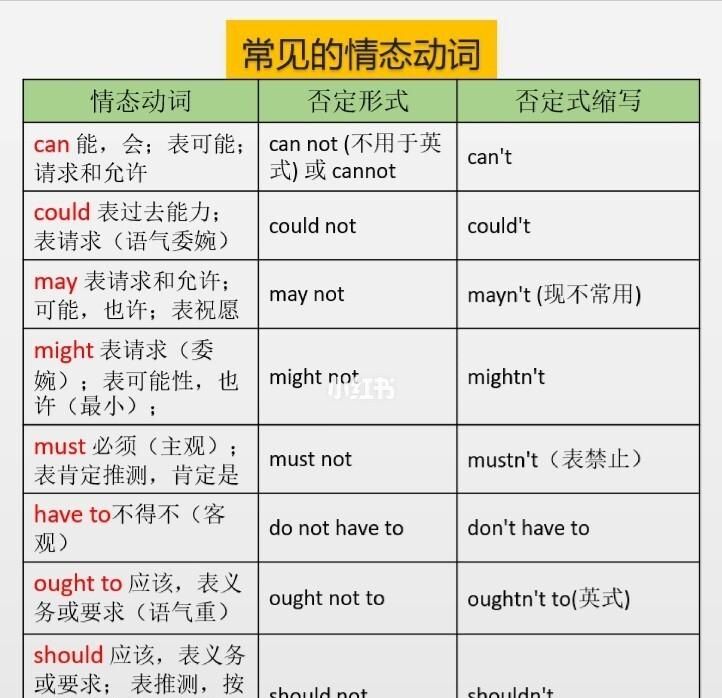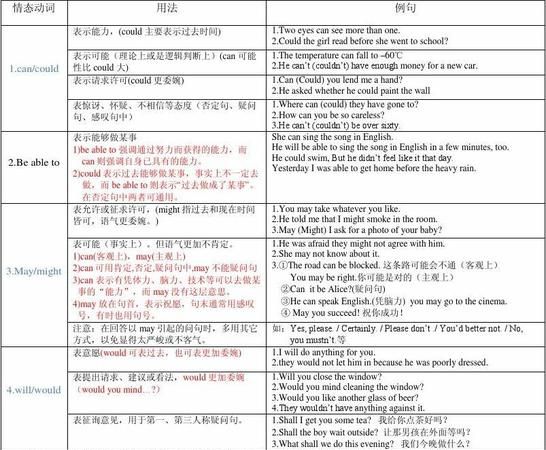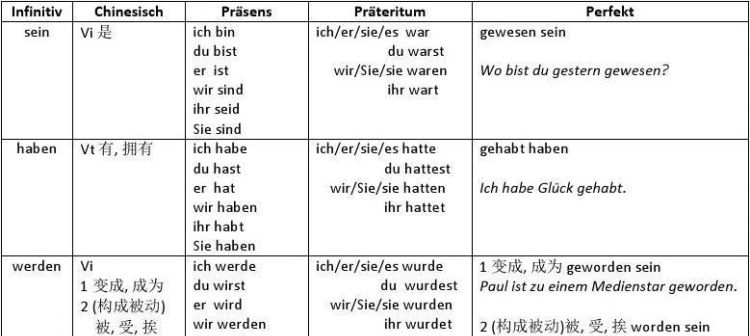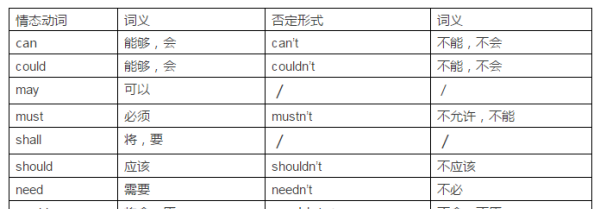本文目录
英语中情态动词的用法归纳总结
情态动词有具体的词义,但也同助动词一样,需要与其他词语一起构成 句子 的谓语,另外情态动词没有人称和数的变化,情态动词后必须跟动词原形。那么接下来给大家分享一些关于英语情态动词用法归纳,希望对大家有所帮助。
英语情态动词用法归纳
1. can 的用法:
(1).表示能力、许可、可能性。 表示能力时一般译为“能、会”, 即有种能力,尤其是生来具备的能力,此时may 和must均不可代替它。如:She can swim fast, but I can’t . 她能游得很快,但我不能。I can see with my eyes. 我用眼睛看。
(2).表示许可,常在口语中。如:You can use my dictionary. 你可以用我的字典。
(3).表示推测,意为“可能”, 常用于否定句和疑问句中, 此时can’t 译为“ 不可能”。 如:Can the news be true? 这个消息会是真的吗?—Can it be our teacher?那个人有可能是我们老师吗?—No, it can’t be our teacher. He is on a visit to the Great Wall.不可能。咱们老师正在游览长城呢。
【例题】—I think Miss Gao must be in the library. She said she would go there. —No. She __be there, I have just been there. A.can’t B.mustn’t C.needn’t D.wouldn’t
【解析】根据下文“我刚去过那儿”可知,应为“ 不可能”, can’t 表示推测[答案] A
2. could的用法:
(1).can的过去式,意为“ 能、 会”,表示过去的能力。如:He could write poems when he was 10. 他十岁时就会写诗。
(2). could在疑问句中,表示委婉的语气,此时 could 没有过去式的意思。如:Could you do me a favour? 你能帮我个忙吗?—Could I use your pen? 我能用一下你的钢笔吗? —Yes, you can.可以。(注意回答)
3. may的用法:
(1).表示请求、许可,比can 正式,如:May I borrow your bike? 我可以借你的自行车吗?You may go home now. 现在你可以回家了。
【例题】—_______ I borrow your MP3? —Sure . Here you are. A. May B.Should C.Must D. Would
【解析】 在此处表示请求,意为“ 做……可以吗”。 答案:A
(2) .表示推测,谈论可能性,意为“ 可能, 或许”,一般用于肯定句中。 如:It may rain tomorrow . 明天可能会下雨。She may be at home. 她可能在家呢.
(3) .may的过去式为might ,表示推测时。可能性低于may。 如:He is away from school. He might be sick.
他离开学校了,可能是他生病了。
(4) . 表示希望、祈求、祝愿,常可译为“祝愿”。通常是用may +主+V 例如:May you have a good time. 祝你过得愉快。May you be happy! 祝你幸福! May you succeed!祝你成功!
4. must的用法:
(1).must 表示主观看法,意为“必须、一定”。 如:You must stay here until I come back.在我回来之前你必须呆在这儿。Must I hand in my homework right now? 我必须现在交作业吗?
(2) 其否定形式mustn’t表示“ 一定不要 ” “千万别” “禁止, 不许”. 如:You mustn’t play with fire. 你不许玩火。You mustn’t be late. 你一定不要迟到。
(3)对must引导的疑问句,肯定回答为must,否定回答为needn’t 或 don’t have to .如:—Must I finish my homework?我现在必须完成作业吗?—No, you needn’t.不,你不必。
(4)must表示有把握的推测,用于肯定句。如: The light is on, so he must be at home now.灯亮着,他现在肯定在家。
注意其反意问句的构成形式:
当must表示肯定的判断、推测时,其反意疑问句要用实际问句的助动词来构成。如:She must have seen the film before,hasn’t she?(注意反意疑问句的后半部分)You must have met uncle Wang in the shop yesterday,didn’t you? (注意反意疑问句的后半部分)
5. need的用法:
(1).need 表示需要、必须,主要用于否定句和疑问句中,其否定形式为needn’t,意为“没有必要,不必”。 用need 提问时,肯定回答为 must,否定回答为 needn’t或don’t have to。 如:—Need I stay here any longer? 我还有必要留在这儿吗?—Yes, you must .是的。—No. you needn’t /don’t have to. 不, 你不必。
(2).need 还可以作实义动词,此时有人称、数和时态的变化,如果是人作主语后边多接动词不定式。如:I need to do it right now. 我需要马上做这件事。He needs to learn more about the girl.他需要多了解那个女孩。
如果是物作主语,一般用need doing 与 need to be done这种情况下应注意两点:
①.主动形式的动名词doing具有被动的含义;②.该动名词可以改为其动词不定式的被动形式而句子的意义不变。例如:. The door needs painting. = The door needs to be painted. 那扇门需要油漆一下。Your car needs mending. = Your car needs to be repaired. 你的车需要维修了。
6. dare 的用法:dare意为“敢、敢于”, 用法近似于need,有两种词性:
(1)dare 作为情态动词,多用于否定句、疑问句或条件句中,无第三人称单数形式,只有一般现在时和一般过去时。如:Dare he tell them what he knows? 他敢告诉他们所知道的情况吗?I daren’t ask her – will you do it for me? 我可不敢问她,你能帮我问问吗?
(2)dare 作为实义动词,此时有人称、数及时态的变化。如:He doesn’t dare to break his promise.他不敢食言。
注意:在口语中,dare 的各种形式常与不带to 的不定式连用。如:Do you dare tell her what I said?
你敢告诉她我说的话吗?I didn’t dare look at him.我不敢看他。
英语情态动词讲解:
一、九大情态动词的时态关系:
1. 现在式 can -- 过去式 could
2. 现在式 may -- 过去式 might
3. 现在式 shall -- 过去式 should
4. 现在式 will -- 过去式 would
5. 现在式 must -- 过去式 must (常用had to来代替)
二、情态动词表示“可能”或“预测”
(can, could, will, would, shall, should, must, ought to)
(1)can 和 could 用于表示“可能”或“预测”:
1. He can't be at home. 他不可能在家。(否定句)
2. Can the news be true? 这消息可能是真的吗? (将情态动词 can 置于主语 the news 前就成疑问句)
3. Anybody can make mistake. 任何人都可能犯错误。(只表示理论上的可能性)
(2)may 和 might 用于表示“事实上的可能性”或“预测”:
1. It may rain tomorrow. (表示可能会发生) 明天可能会下雨。
2. It may snow later this afternoon. (表示预测) 今天下午可能会下雪。
3. You might be right. (表示有可能) 你可能是对的。
(3)will 和 would 用于表示“预测”或“习惯性”:
1. I think he will be all right now. 我想他现在一定好了。 (will be 表示一定会)
2. That would be his mother. 那肯定是他母亲。(would be 表示肯定是)
3. He will sit there hour after hour looking at the river.
他经常一连几个小时坐在那儿看着河水。(will 表示经常的)
(4)shall 和 should 用于表示“必定”:
1. I shall be rich one day. (shall be ) 总有一天我会发达的。
2. That should be Sam and his mother. (should be)那准是Sam和他的母亲。
(5)must 用于表示“必定”,“必会”:
1. This must be good for you.(must be 肯定) 这肯定对你是有益的。
2. All mankind must die.(表示必然会发生的事) 所有的人一定会死的。
3. Mustn't there be a mistake? (mustn't 多用于疑问句) 那肯定会有错误吗?
三、情态动词表示“许可”、“请求”
(can, could, will, would, shall, should, may, might, must)
(1)can 和 could 用于表示“许可”、“请求”:
1. Can I go with you? (请求)我能跟你一起走吗?
2. Father said I could go to cinema. (表示过去的许可) 爸爸说我可以去看电影。
3. Could I ask you something? (请求,用 could 比 can 更婉转)我可以问你一件事吗?
(2)will 和 would 用于表示“请求”
1. Will you kindly tell me the way to the post office? 请问到邮局怎么走?(表示客气请求)
2. Would you give me your address? 请你告诉我你的地址,好吗?(用would比will表示更客气)
(3)shall 和 should 用于第一人称,表示征求对方的意见
1. Shall we talk? 我们谈谈好吗?
2. What should we do next? (用should 比 shall 表示更客气) 下一步我们该怎么做?
3. Shall he come to see you? (用于第三人称疑问句) 要不要他来看你?
(4)may 和 might 用于表示“许可”(口语中多用can)
1. You may take a walk. (表示给予许可) 你可以散散步。
2. You might read the story for me. (比may更婉转) 是否请给我读一读这 故事 。
3. May I make a suggestion? 我可以提个建议吗?
4. Might I take a look of your work? 我看看您的大作行吗?
5. Students may not make noise in the library. (may not 表示不许可或禁止)
学生不得在图书馆里吵闹。
6. If I may say so, you are not right. (用于条件句,表示请求)
你是不对的,如果我可以这么说的话。
(5)must 用于表示“禁止”,“不准”:
1. Cars must not be parked here. (must not表示不许可) 此地不准停车。
2. All of you mustn't fishing in the pool. (must not 语气方面比 may not 更强)
你们不准在池里钓鱼。
情态动词用法归纳:
一、 can, could
1) 表示能力(体力、知识、技能)。
Can you lift this heavy box?(体力)
Mary can speak three languages.(知识)
Can you skate?(技能)
此时可用be able to代替。Can只有一般现在时和一般过去式;而be able to则有更多的时态。
I’ll not be able to come this afternoon.
当表示“经过努力才得以做成功某事”时应用be able to,不能用Can。如:
He was able to go to the party yesterday evening in spite of the heavy rain.
2) 表示请求和允许。
-----Can I go now?
----- Yes, you can. / No, you can’t.
此时可与may互换。在疑问句中还可用could,
might代替,不是过去式,只是语气更委婉,不能用于肯定句和答语中。
---- Could I come to see you tomorrow?
---- Yes, you can. ( No, I’m afraid not. )
3) 表示客观可能性(客观原因形成的能力)。
They’ve changed the timetable, so we can go by bus instead.
This hall can hold 500 people at least.
4) 表示推测(惊讶、怀疑、不相信的态度),用于疑问句、否定句和感叹句中。
Can this be true?
This can’t be done by him.
How can this be true?
二、 may, might
1) 表示请求和允许。might比 may语气更委婉,而不是过去式。否定回答时可用can’t
或mustn’t,表示“不可以,禁止”。
----Might/ May I smoke in this room?
---- No, you mustn’t.
---- May/Might I take this book out of the room?
---- Yes, you can. (No, you can’t / mustn’t. )
用May I...?征徇对方许可时比较正式和客气,而用Can I...?在口语中更常见。
2)用于祈使句,表示祝愿。
May you succeed!
3) 表示推测、可能性(不用于疑问句)。
might不是过去式,它所表示的可能性比may小。
1.He may /might be very busy now.
2.Your mother may /might not know the truth.
三、 must, have to
1) 表示必须、必要。
You must come in time.
在回答引出的问句时,如果是否定的,不能用mustn’t(禁止,不准),而用needn’t, don’t have to(不必).
---- Must we hand in our exercise books today?
---- Yes, you must.
---- No, you don’t have to / you needn’t.
2) must是说话人的主观看法, 而have to则强调客观需要。Must只有一般现在时, have to 有更多的时态形式。
1. he play isn’t interesting, I really must go now.
2. I had to work when I was your age.
3) 表示推测、可能性(只用于肯定的陈述句)
1. You’re Tom’s good friend, so you must know what he likes best.
2. Your mother must be waiting for you now.
四、 dare, need
1) dare作情态动词用时, 常用于疑问句、否定句和条件从句中, 过去式形式为dared。
1. How dare you say I’m unfair?
2. He daren’t speak English before such a crowd, dare he?
3. If we dared not go there that day, we couldn’t get the beautiful flowers.
2) need 作情态动词用时, 常用于疑问句、否定句。在肯定句中一般用must, have to, ought to, should代替。
1.You needn’t come so early.
2. ---- Need I finish the work today?
---- Yes, you must. / No, you needn’t.
3) dare和 need作实义动词用时, 有人称、时态和数的变化。在肯定句中,dare后面常接带to的不定式。在疑问句和否定句中,dare后面可接带to或不带to的不定式。而need后面只能接带to的不定式。
1. I dare to swim across this river.
2. He doesn’t dare (to) answer.
3. He needs to finish his homework today.
英语情态动词用法归纳相关 文章 :
★ 高考英语情态动词语法知识点与用法
★ 2020高三英语语法情态动词整理归纳
★ 情态动词英语语法知识点汇总
★ 初中英语情态动词之shall和should的正确用法
★ 高考英语情态动词用法与书面表达范例
★ 英语语法掌握情态动词
★ 英语中情态动词may, might的用法
★ 英语语法网情态动词讲解
★ 英语作文之情态动词

初二英语上册重点知识点归纳
初二英语情态动词知识点归纳
1.1 初中英语情态动词的语法特色CopyRight .com
1)初中英语 情态动词不能表示正在发生或已经发生的事情,只表示等候或估计某事的发生。
2) 情态动词 除ought 和have 外,后面只能接不带to 的不定式。
3) 情态动词没有人称,数的变更,即情态动词第三人称单数不加-s。
4) 情态动词没有非谓语形式,即没有不定式,分词,等形式。
21.2 比较can 和be able to的初中英语情态动词
1)can could 表示才干;可能 (过去时用could),
只用于现在式和从前式(could)。be able to能够用于各种时态。
They will be able to tell you the news soon. 他很快就能告诉你消息了。
2)只用be able to
a. 位于助动词后。
b. 情态动词后。
c. 表示从前某时刻动作时。
d. 用于句首表示前提。
e. 表示成功地做了某事时,只能用was/were able to, 不能用could。
He was able to flee Europe before the war broke out.
= He managed to flee Europe before the war broke out.
初中英语情态动词注意:could不表示时态内容来自
1)提出委婉的恳求,(留神在答复中不可用could)。
--- Could I have the television on?
--- Yes, you can. / No, you can't.CopyRight .com
2)在否定,疑问句中表示推测或猜疑。
He couldn't be a bad man.
他不大可能是坏人。
21.3 比较may和might内容来自
1) 表示允许或要求;表示不控制的推测;may 放在句首,表示庆祝。
May God bless you!
He might be at home.
初中英语情态动词注意: might 表示推测时,不表示时态。只是可能性比may 小。
2) 成语: may/might as well,后面接不带to 的不定式,意为"不妨"。
If that is the case, we may as well try.
初中英语情态动词典型例题
Peter ___come with us tonight, but he isn't very sure yet.
A. must B. may C. can D. will
答案B. 表可能性只能用may. 此句意可从后半句推出。
初二英语情态动词学习巩固
21.4 比较have to和must
1) 两词都是'必须'的意思,have to 表示客观的须要, must 表示谈话人主观上的看法,既主观上的必要。
My brother was very ill, so I had to call the doctor in the middle of the night. 我弟弟病得很厉害,我只得深夜里把医生请来。(客观上需要做这件事)
He said that they must work hard. 他说他们必须努力工作。(主观上要做这件事)
2) have to有人称、数、时态的变革,而must只有一种形式。但must 可用于间接引语中表示过去的必要或义务。
He had to look after his sister yesterday.
3) 在否定构造中: don't have to 表示"不必"CopyRight .com
mustn't 表示"禁止",
You don't have to tell him about it. 你不一定要把此事告诉他。
You mustn't tell him about it. 你一定不要把这件事告知他。
21.5 must表示推测
1) must用在肯定句中表示较有把握的推测,意为"一定"。
2) must表对现在的状态或现在正产生的事件的推测时, must 后面通常接系动词be 的本相或举动动词的进行式。
You have worked hard all day.You must be tired. 你辛苦干一终日,必定累了。(对现在情形的揣测判断)内容来自
He must be working in his office. 他一定在办公室工作呢。
初中英语情态动词比较:
He must be staying there.
他现在肯定呆在那里。
He must stay there.
他必须呆在那。
3) must 表示对已发生的事情的推测时,must 要接完成式。
I didn't hear the phone. I must have been asleep. 我刚才没有听到电话,我想必是睡着了。内容来自
4) must表示对过去某时正发生的事情的推测,must 后面要接不定式的完成进行式。
---Why didn't you answer my phone call?
---Well, I must have been sleeping, so I didn't hear it.
5) 否定推测用can't。
If Tom didn't leave here until five o'clock, he can't be home yet. 如果汤姆五点才离开这儿,他此时一定还未到家。
21.6 表示推测的用法
can, could, may, might, must 皆可表示推测,其用法如下:CopyRight .com
1)初中英语情态动词+动词原形。
表示对当初或将来的情况的揣摩,此时动词通常为系动词。
I don't know where she is, she may be in Wuhan.
2)情态动词+动词现在进行时。
表示对现在或未来正在进行的情况进行推测。
At this moment, our teacher must be correcting our exam papers.
这时,咱们老师想必在批改试卷。
3)初中英语情态动词+动词实现时。
表示对过去情况的推测。
We would have finished this work by the end of next December.
明年十二月底前咱们很可能已完成这项工作了。
The road is wet. It must have rained last night.
地是湿的,昨天晚上一定下雨了。
4)情态动词+动词的当初实现进行时。内容来自
表示对过去正在发生事件的推测。CopyRight .com
Your mother must have been looking for you.
你妈妈一定始终在找你。CopyRight .com
5)推测的否定形式,疑问形式用can't, couldn't表示。
Mike can't have found his car, for he came to work by bus this morning.
迈克一定还没有找回他的车,因为早上他是坐公共汽车来上班的。
初中英语情态动词注意:could, might表示推测时不表示时态,其推测的程度不如can, may。CopyRight .com
21.7 情态动词+ have +过去分词
1) may(might) have + done sth, can (could) have + done sth 表示过去,推测过去时光里可能发生的事情。
Philip may (might) have been hurt seriously in the car accident.
Philip can (could) have been hurt seriously in the car accident.
2) must have +done sth,对过去时间里可能发生的事情的推测,语气较强,存在"肯定","谅必"的`意思。CopyRight .com
---Linda has gone to work, but her bicycle is still here.
---She must have gone by bus.
3) ought to have done sth, should have done sth
本应该做某事,而事实上并不做。否定句表示"不该做某事而做了"。
You ought to (should) have been more careful in this experiment.
He ought not to have thrown the old clothes away.(事实上已扔了。)
ought to 在语气上比should 要强。
4) needn't have done sth 本没必要做某事
I dressed very warmly for the trip, but I needn't have done so. The weather was hot.CopyRight .com
5) would like to have done sth 本打算做某事
I would like to have read the article, but I was very busy then.CopyRight .com
21.8 should 跟ought to
should 和ought to 都为"应当"的意思,可用于各种人称。
---Ought he to go?
---Yes. I think he ought to.
表示请求,命令时,语气由 should(应该)、had better最好)、must(必须)渐强
21.9 had better表示"最好"
had better 相当于一个助动词,它只有一种形式,它后面要跟动词原形。CopyRight .com
had better do sth
had better not do sth
It is pretty cold. You'd better put on my coat.内容来自
She'd better not play with the dog.
had better have done sth表示与事实相反的结果,意为"本来最好"。
You had better have come earlier.
21.10 would rather表示"甘心"
would rather do
would rather not do
would rather… than… 宁愿……而不愿。
还有would sooner, had rather, had sooner都表示"宁愿"、"宁肯"的意思。CopyRight .com
If I have a choice, I had sooner not continue my studies at this school.
I would rather stay here than go home. = I would stay here rather than go home.
初中英语情态动词典型例题
----Shall we go skating or stay at home?
----Which ___ do?
A. do you rather B. would you rather C. will you rather D. should you rather
谜底B。本题考察情态动词rather的用法,would rather +do sth 意为"情愿",本题为疑问句,would 提前,所以选B。
21.11 will和would
初中英语情态动词注意:
1)would like; Would like to do = want to 想要,为固定搭配。
Would you like to go with me?
2)Will you…? Would you like…? 表现断定含意的请求奉劝时,疑难句中个别用some, 而不是any。
Would you like some cake?
3)否定结构中用will,一般不用would, won't you是一种委婉语气。
Won't you sit down?
21.12 情态动词的回答方式CopyRight .com
问句 肯定回答 否定回答
Need you…? Yes, I must. No,I needn't
Must you…? /don't have to.
典范例题
1)---Could I borrow your dictionary?
---Yes, of course, you____.
A. might B. will C. can D. should
答案C.could表示委婉的语气,并不为时态。答语中of course,表示确定的语气,允许某人做某事时,用can和 may来表白,不能用could或might。复习: will 与you连用,用来提出要求或下命令。should与you 连用,用来提出劝告。
2)---Shall I tell John about it?
---No, you ___. I've told him already.
A. needn't B. wouldn't C. mustn't D. shouldn't
答案A。needn't 不必,不用。 wouldn't 将不, 不会的。 mustn't 制止、不能。 shouldn't 不应该。本题为不需要,不必的意思,应用needn't。
3)---Don't forget to come to my birthday party tomorrow.
---______.
A. I don't B. I won't C. I can't D. I haven't内容来自
答案B. will既可当作情态动词,表要求、倡导、也可作为实义动词表"意愿、意志、信心",本题表示信念,选B。
21.13 带to 的情态动词
带to 的情态动词有四个:ought to, have to, used to, be to, 如加上have got to ,(=must), be able to,为六个。它们的疑问,否认情势应予以留心:
Do they have to pay their bill before the end of the month?
She didn't use to play tennis before she was fourteen.
You ought not to have told her all about it.
Ought he to see a heart specialist at once.?
ought to 本身作为情态动词应用。其余的词作为实义动词利用,变疑问,否定时,须有do 等助动词辅助。
初中英语情态动词典型例题
Tom ought not to ___ me your secret, but he meant no harm.
A.have told B.tell C.be telling D. having told
答案A。由于后句为过去时,告诉秘密的动作又发生在其前因,此地应用过去完成时,但它在情态动词 ought to 后,所以用have。
21.14 比拟need和dareCopyRight .com
这两词既可做实义动词用,又可做情态动词用。作为情态动词,两者都只能用于疑难句,否定句跟条件句。 need 作实义动词时后面的不定式必需带to,而dare作实义动词用时, 后面的to 时常可能被省略。
1) 实义动词: need (需要, 请求)
need + n. / to do sth
2)初中英语 情态动词: need,只用原形need后加do,否定形式为need not。
Need you go yet?内容来自
Yes, I must. / No, I needn't.

情态动词表推测的用法
英语情态动词表
词义 现在式 过去式 同义短语
能够,可能 can could Be able to
许可,也许 may Might
必须,一定 must Had to Have to
应当,要 Shall should Ought to
愿意,要 Will Would
需要 need
敢 Dare
情态动词的特点:无人称和数的变化,后跟动词原形。
一 Can / could / be able to
1 表示能力 (时态的区别)
2 对现在情况表示揣测, 一般只用于否定句,疑问句或感叹句。
这消息不可能是真的。
他怎么会相信这些谣言呢?
3 表示可能,可以。
如果你愿意,你可以和我们一起去。
二 May / might
1 可能,或许
带把伞吧,可能会下雨。
2 表示祈祷,愿望等。 May + 宾语 + 动词原形。
愿上帝与你同在!
祝你成功!
祝你幸福!
三 Must / have to
1 must 表示必须,否定回答用“needn’t”
Have to 着重于外在的压力,有“不得已而为之”的意思, must则强调“内在的职责”.
2 must 表示很肯定的揣测。
Must + have + 过去分词 表示对已经发生的情况表示揣测。
四 Shall 用作情态动词时,一般表示提建议,或征求对方的允诺。
Shall 用于一,三人称,will用作情态动词时,用于第二人称。
五 should / ought to 应该
should 侧重说话者主观的看法,ought to 更着重客观的情况。
六 Need / dare 用作情态动词时,只用于否定句,疑问句。

情态动词有哪些?
情态动词如图所示:

情态动词表示说话人对某一动作或状态的态度,表示“可能”,“可以”,“需要”,“必须”,“应当”等意思。情态动词没有人称和数的变化,后面的动词要用原形。

扩展资料:
can和could的用法
1、can的用法
(1)表示体力和脑力方面的能力。
(2)表示对现在的动作或状态进行主观的猜测,主要用在否定句和疑问句中。
(3)表示可能性,理论上的可能性,意为“有时候可能会”,可用于肯定句。
(4)表示允许,意思与may接近。
(5)表示说话人的推测、怀疑、惊异、猜测或不肯定等,主要用于否定句、疑问句或感叹句中。
(6)can的特殊句型
cannot…too/enough表示“无论怎么。。。也不过分”。“越。。。越好”。
cannot but+do sth.表示“不得不,只好”。
2、could的用法
(1)表示能力,指的是过去时间。
(2)表示允许,指的是过去时间。
(3)表示可能,可以指过去时间,也可以指现在时间,表示语气缓和。
(4)委婉客气地提出问题或陈述看法,指的是现在时间。主要用于疑问句,回答时用can。
3、can与could的区别
can表推测时只用于否定句和疑问句(could无此限制)。couldn’t的可能性比can’t小。
4、can与be able to的区别
(1)现在时:无区别,但后者不常用。
(2)完成时;can没有完成时,此时要用have(has,had)been able to。
(3)将来时:can没有将来时,要用will be able to。
(4)过去时:could表示一般能力,was/were able to表示在具体场合通过努力成功做成某事的能力。
以上就是关于情态动词表格归纳 ,英语中情态动词的用法归纳总结的全部内容,以及情态动词表格归纳 的相关内容,希望能够帮到您。

